Leaders and experts from around the world engage in in-depth discussions at Global Prosperity Summit 2024 (Part 2)
14 May ,2024
(Hong Kong, 14 May 2024) – Global Prosperity Summit 2024 (GPS 24) held at The Fullerton Ocean Park Hotel Hong Kong today, bringing together global leaders and experts from across disciplines for in-depth exchange on the most pressing issues impacting global prosperity. Leveraging Hong Kong’s distinctive advantages under the “one country, two systems” principle, the Summit also aims to enhance the city’s role as an intermediary between Mainland China and the rest of the world by facilitating dialogue and communication.
Mrs. Regina Ip, a founder of GPS 24 and Chairperson of the Savantas Policy Institute, said in her opening remarks, “We have decided to hold a conference on global prosperity because prosperity is vital to our future but global commitment to promoting greater prosperity for all is not salient. Multiple threats to the continued spread of prosperity loom on the horizon. Great power obsession with challenge to its global dominance has led to protectionist policies of tariff hikes, financial sanctions and export controls to deny developing countries access to advanced technologies. The world is being fractured into opposing geopolitical blocs.”
“The free trade and investment environment in the past few decades, which have helped lift hundreds of millions of people out of poverty, seems to belong to a bygone era. With national elections in 64 countries, plus elections in the European Union, affecting 49% of the world’s population taking place this year, politics seems to trump economics in elections that matter greatly to the future of mankind. In addition, there are troubling signs of rising polarisation and political violence, not to mention extremely dangerous wars being fought in Ukraine and the Middle East. Hong Kong being a small but open economy, we have a high degree of exposure to global risks, and a keen interest in promoting common ground toward resolving these problems.”
“For this reason we decided to pinpoint five most pressing issues impacting global prosperity for discussion - from great power competition to de-globalisation, national security obsession, and the need for greater cooperation in science and technology development and in fighting climate change. With so many talented speakers and seasoned moderators, I am sure we will have a very productive day filled with inspiring discussions.”
At noon, Professor Roger D. Kornberg, Mrs. George A Winzer Professor in Medicine, Professor of Structural Biology at Stanford University’s School of Medicine and Nobel laureate (2006), delivered his keynote speech.
Drawing on his extensive experience and research, Professor Kornberg described the challenges and constraints of today's drug research and development, giving examples of how scientists are using relevant platforms and technologies to accelerate new drug discovery, reduce costs and improve quality, and explained why the human immune system is not able to protect against cancer.
The remaining two panels continued in the afternoon.
Professor Cheng Li, Professor and Founding Director of the Centre on Contemporary China and the World at the University of Hong Kong.
Speakers:
Mr. Hashim Djojohadikusumo, Chairman and CEO of ARSARI Group of Companies.
Ambassador Jean De Ruyt, Co-Chair, Europe-Asia Center
Ms. Susan A. Thornton, Senior Fellow and Visiting Lecturer, Paul Tsai China Center, Yale Law School
Professor Yang Jiemian, Chairman of Academic Advisory Council of Shanghai Institutes for International Studies.
Mr. Hashim Djojohadikusumo
- Sees rivalry between US and China as a combination of 30% ideological – a battle between “communism and so-called free market democratic US exceptionalism” – and 70% geopolitical competition.
- When asked by Professor Li about what advice he would give to the next US president, Djojohadikusumo remarked that his country felt “the US was very aggressive.” He noted that the fear from Indonesia was that “the new administration may want to… give us a message [that] you are with us or you are against us, and that is what we are afraid of.” Djojohadikusumo emphasised that “Indonesia wants to be neutral forever.” He asked that the US “be respectful of the interests of different countries.”
Ms. Susan A. Thornton
- Ms. Thornton offered an alternative view on the US-China rivalry, arguing that ideological and geopolitical issues have always existed in “the last 45 years of [the US-China] relationship.” She noted, instead, that the main difference has been in “psychological factors,” as explained by Graham Allison’s Thucydides Trap. She noted that “it is this issue of all of a sudden perceiving your rival is nipping at your heels, [the] sudden kind of perception and fear of what might happen if they catch up to you.” Thornton added that domestic and leadership factors also played a large role in the US-China rivalry.
- On the panellists’ comments regarding the current multipolar world, Ms. Thornton remarked: “I don't think the world wants to have or thinks that it is beneficial to have a US that is insecure. So I would say that it would be helpful if the Chinese could think about this problem of transition, which they thought about, I think, very much earlier in this century, and how to ease the transition of the US from a unipolar to a multipolar world.”
- Ms. Thornton also noted that “there's a consensus that the autocracy versus democracy framing for foreign policy was not very popular or useful. And that's because in foreign policy, you want to be able to have the room to pursue your country's interests. Not that it's exclusive of values, but it's really an interest-based pursuit.” She agreed with Professor Yang's comments on “coming up with some kind of common purpose that we can all work towards together.”
Ambassador Jean De Ruyt
- Ambassador De Ruyt noted that we “live in a world where there are threats that are irreversible,” and added that “for us in Europe, it is very important that our partners agree… and participate actively and cooperate in order… to face these challenges.”
Professor Yang Jiemian
- On the current status of US-China relations, Professor Yang Jiemian stated that apart from geopolitical, ideological and economic considerations, the US’ anxiety of losing its position as an international hegemonic power, and its belief that China is the only country that has the intention and capability to replace the US, also factors into play. Professor Yang reiterated that China does not agree with this characterisation.
- Asked by Professor Li Cheng about what the US-China relationship may look like if Donald Trump is elected, Professor Yang Jiemian noted that while “China does not interfere with the US’ domestic elections, this does not say that the Chinese do not pay attention. We firmly believe that it is the Americans who decide who will be the next president of the United States,” but “many of my colleagues would suggest we must prepare for the challenges rather than guessing who will be the next president of the United States. That is to say we must calculate and factor in all possible challenges and difficulties… As the Chinese saying goes, ‘Always prepare for the rainy days.’”
- Li Cheng noted that this year was the 70th anniversary of the Five Principles of Peaceful Coexistence, and asked whether these principles were “still relevant in today’s world.”
- Professor Yang replied that “China thinks that peaceful coexistence should be one of the main principles to govern the relations between China and other countries,” and he further suggested: “how about we move forward from peaceful co-existence to peaceful cooperation?”
Mr. T.K. Chiang, Chief Executive Officer, CLP Holdings Limited
Speakers:
H.E. Madame Irina Bokova, Former Director General of UNESCO, Patron of the International Science Council and Co-chair of the ISC’s Global Commission on Science Missions for Sustainability
Mr. Winfried Engelbrecht-Bresges, GBS, JP, Chief Executive Officer, The Hong Kong Jockey Club.
Professor Ye Qi, Chair Professor of the Society Hub, The Hong Kong University of Science and Technology (Guangzhou)
H.E. Madame Irina Bokova
- Madame Bokova noted that there is “a lot of disconnect… [and] tension between politicians and scientists,” which begs the question of how we can “get some of the important messages of scientists to reach those decision makers” who might “finally adopt these documents.” She added that “in order for political circles, for politicians to have more… scientific literacy… scientists also should play a bigger role in this kind of scientific literacy, and even a pedagogical approach to the politicians.”
- Madame Bokova emphasised that “Europe will play a very important role in this global conversation [on climate change. I think Europe is the link between sustainability, climate, and human development. I think it’s the tradition, so to say, the European values.”
Mr. Winfried Engelbrecht-Bresges, GBS, JP
- Mr. Engelbrecht-Bresges outlined the past, present and future environmental sustainability initiatives undertaken by the Hong Kong Jockey Club, underlining the importance of achieving buy-in from all employees at HKJC. He stressed that it was imperative for all in the Jockey Club to understand why the club was pursuing sustainability across all aspects of its operations, from its racecourses to its charities trust.
- On climate change, Mr. Winfried Engelbrecht-Bresges remarked that by bringing our convening power, financial resources and expertise in the East, HKJC is building a global network of resources dedicated to strengthening global health resilience to climate change, hoping the models and insights can be applied to Hong Kong.
- On sustainability, HKJC sees the opportunity for the Trust to create a social impact measurement framework and approach that can be shared and applied to businesses and philanthropists alike.
Professor Ye Qi
- Professor Ye Qi stressed the importance of turning academic research into practical solutions. He quoted his work on the city of Baoding in Hebei province, one of Mainland China’s first low-carbon pilot zones, as an example, to underline his point that when it comes to issues related to climate change, it is not just the physical sciences, but also the social sciences, that matter.
The panel discussions of the Global Prosperity Summit 2024 successfully concluded today. The organisers thanked all the speakers and experts who have travelled from all over the world to share their insights on global prosperity, and expressed gratitude to all participants. The organisers believed that GPS 24 would benefit all in society, and look forward to staging the next Global Prosperity Summit.
The Global Prosperity Summit 2024 has come to a successful conclusion today. We are grateful to all the speakers and experts who have travelled from all over the world to participate in the Summit and expressed their far-sighted views on global prosperity; and to the 200-odd guests who have come to support us, as we believe that the content of the Summit will benefit all sectors of the community. We look forward to seeing you again at the next Global Prosperity Summit.
Ends
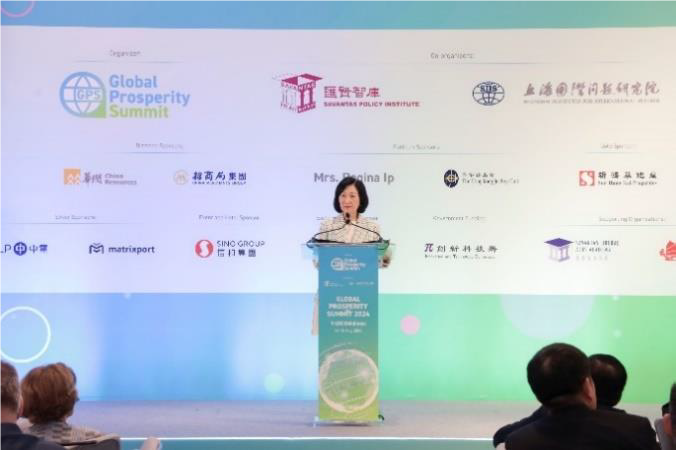
Photo 1:
Mrs. Regina Ip, a founder of Global Prosperity Summit 2024
and Chairperson of Savantas Policy Institute, delivered welcome remarks.
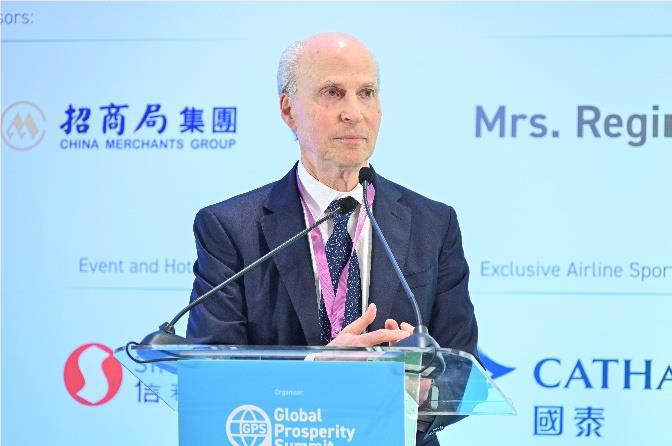
Photo 2:
Professor Roger D. Kornberg, Mrs. George A Winzer Professor in Medicine,
Professor of Structural Biology at Stanford University’s School of Medicine,
Nobel Laureate (2006) gave a keynote address at the Global Prosperity Summit 2024.
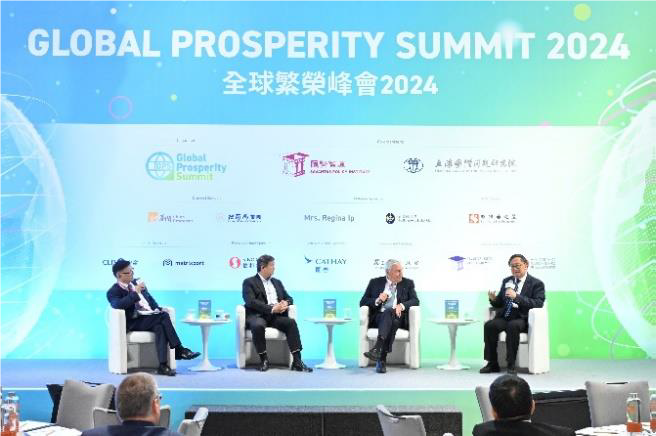
Photo 3:
Panel 4 "Risks of Pan-securitisation and the Impact on Development"
discussed the international relationship and sought to find a new way out.
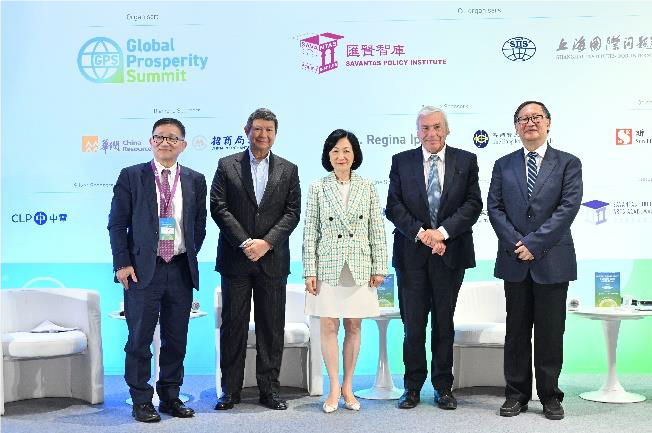
Photo 4:
Group photo of Mrs. Regina Ip, a founder of Global Prosperity Summit 2024
and Chairperson of Savantas Policy Institute, and the speakers of Panel 4.
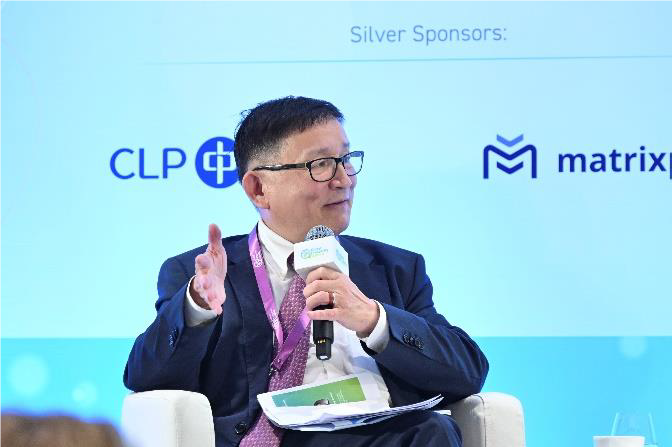
Photo 5:
Panel 4 “Great Power Competition and Peaceful Co-existence” moderator: Professor Cheng Li,
Professor and Founding Director of the Centre on Contemporary China and the World at the University of Hong Kong.
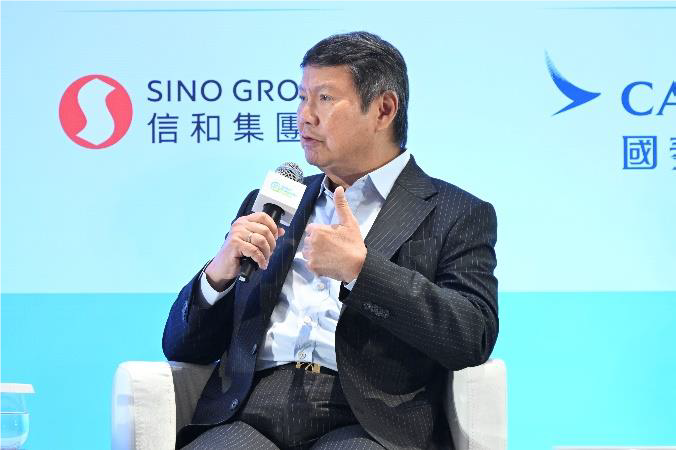
Photo 6:
Panel 4 “Great Power Competition and Peaceful Co-existence” speaker:
Mr. Hashim Djojohadikusumo, Chairman and CEO of ARSARI Group of Companies.
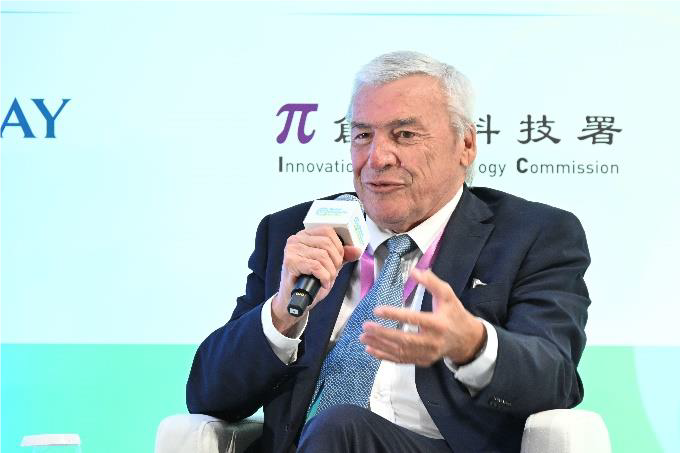
Photo 7:
Panel 4 “Great Power Competition and Peaceful Co-existence” speaker:
Ambassador Jean De Ruyt, Co-Chair, Europe-Asia Center.
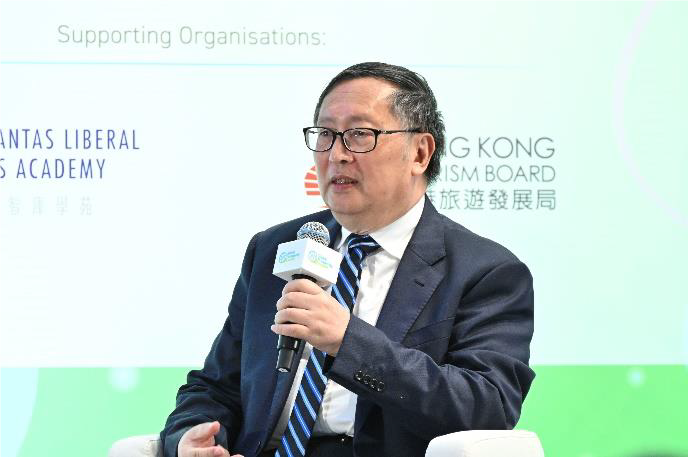
Photo 8:
Panel 4 “Great Power Competition and Peaceful Co-existence” speaker : Professor Yang Jiemian,
Chairman of Academic Advisory Council of Shanghai Institutes for International Studies.
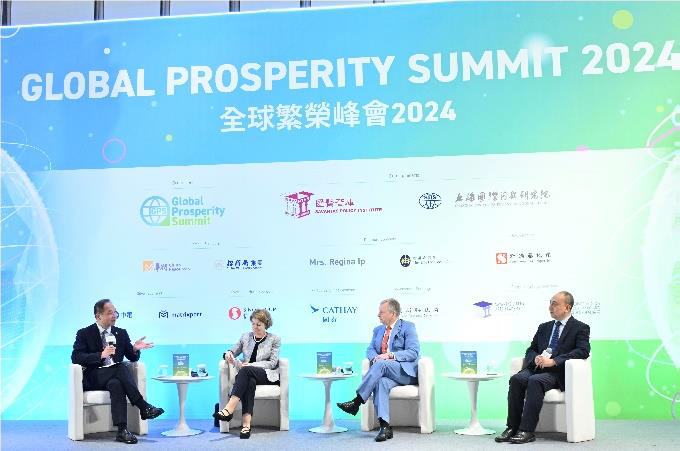
Photo 9:
Panel 5 "Climate Change and Sustainable Development"
mentioned the need for closer cooperation between politics and science to address climate issues.
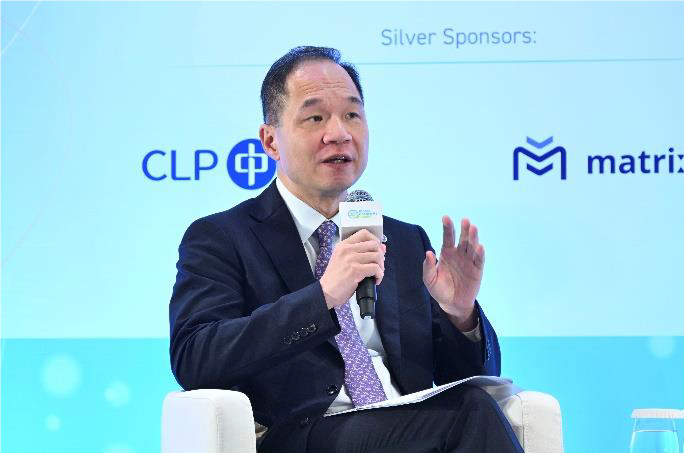
Photo 10:
Panel 5 “Climate Change and Sustainable Development” moderator:
Mr. T.K. Chiang, Chief Executive Officer, CLP Holdings Limited
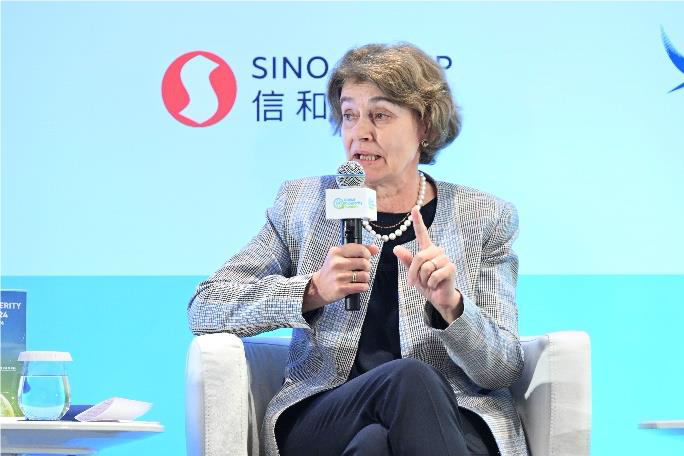
Photo 11:
Panel 5 “Climate Change and Sustainable Development” speaker:
H.E. Madame Irina Bokova, Former Director General of UNESCO,
Patron of the International Science Council and Co-chair of the ISC’s Global Commission
on Science Missions for Sustainability.

Photo 12:
Panel 5 “Climate Change and Sustainable Development” speaker:
Mr. Winfried Engelbrecht-Bresges, GBS, JP, Chief Executive Officer, The Hong Kong Jockey Club.
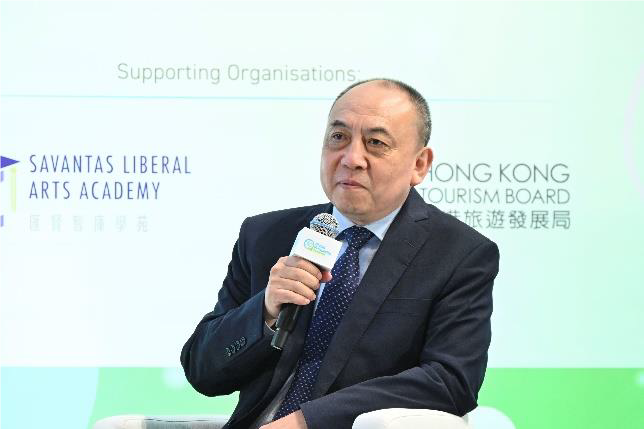
Photo 13:
Panel 5 “Climate Change and Sustainable Development” speaker :
Professor Ye Qi, Chair Professor of the Society Hub,
The Hong Kong University of Science and Technology (Guangzhou).
Link to keynote speech
https://www.youtube.com/watch?v=FOEpys94NFI&ab_channel=SouthChinaMorningPost
About Global Prosperity Summit Hong Kong
Global Prosperity Summit Hong Kong was initiated by a group of business, academic and thought leaders in Hong Kong to provide a platform for frank, objective and rational discussions on dominant issues impacting global prosperity.
About Savantas Policy Institute
Savantas Policy Institute (SPI) was founded in 2006 by a group of Hong Kong belongers with overseas experience who cared deeply about Hong Kong. The core vision of SPI is to enhance Hong Kong’s transformation into a knowledge-based economy. SPI engages mainly in conducting public policy research and analysis; and recommending appropriate long-term developmental strategies; as well as promoting public understanding of and participation in the economic and social development of the Hong Kong Special Administrative Region.
About Shanghai Institutes for International Studies
Established in 1960, Shanghai Institutes for International Studies (SIIS) has played a crucial role in conducting strategic research, providing policy recommendations, and contributing to the understanding of international politics, economics, security, and other related fields. It has evolved into an important institution informing and shaping China’s foreign policy and global engagement, and has been accredited as one of the most influential think tanks in China and around the world.


